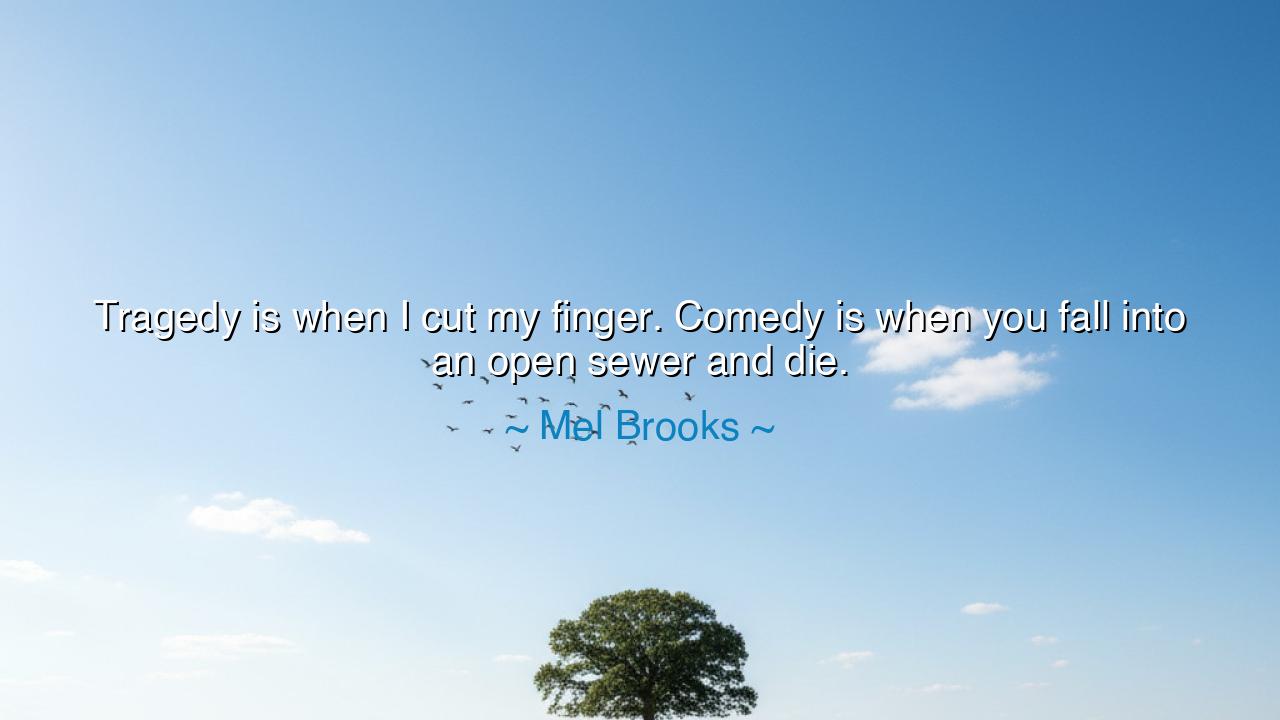
Tragedy is when I cut my finger. Comedy is when you fall into an






In the grand theater of human experience, where joy and sorrow share the same stage, the master of dark laughter, Mel Brooks, once uttered a line that glitters with both humor and truth: “Tragedy is when I cut my finger. Comedy is when you fall into an open sewer and die.” To the casual listener, this may sound cruel — even heartless. Yet to those who see beneath the laughter, it is a revelation about the nature of perception, empathy, and the delicate balance between human suffering and human survival. For Brooks, who made laughter rise from the ashes of despair, this line was not simply a jest, but a profound meditation on how we see pain — our own and that of others.
The origin of this quote can be traced to Brooks’ long life in the art of comedy — a life forged through hardship, war, and the immigrant struggle of early 20th-century America. Having served in World War II and witnessed both cruelty and absurdity on the battlefield, Brooks understood that humor was not born of ignorance, but of endurance. His jest captures a paradox that the ancients themselves would have recognized: that suffering is intimate, while tragedy, observed from afar, becomes spectacle. When pain is personal, it consumes us; when it belongs to another, it becomes a story — one that can provoke not pity, but laughter. Thus, in his line, Brooks reveals both the selfishness and the resilience of the human heart.
This truth echoes back through time. The philosopher Aristotle, in his study of tragedy and comedy, wrote that both spring from the same root — the fallibility of man. Yet while tragedy moves us to tears through identification, comedy allows us to distance ourselves, to view misfortune from a safe height. When Brooks says that his cut finger is tragedy, he confesses that pain is only unbearable when it is ours; when he mocks the other’s fall, he reminds us that laughter is a kind of shield. It is not cruelty, but defense — the mind’s way of surviving a world too heavy with suffering. In laughter, humanity finds distance; in distance, it finds survival.
Consider the story of Charlie Chaplin, the great silent clown, who turned poverty, loneliness, and humiliation into the universal poetry of laughter. In Modern Times, he mocked starvation, machinery, and the loss of humanity — yet his audience wept and laughed at once. Like Brooks, Chaplin understood that comedy and tragedy are not opposites but siblings — two faces of the same coin. A cut finger is felt; a fall is seen. The difference lies not in the event, but in perspective. Comedy is tragedy plus distance, as the philosophers of the stage would say. To laugh at the fall is to admit that life is unbearable — and yet to bear it anyway.
Brooks’ quote also hides a warning within its laughter. It speaks of the narrowness of human empathy, how we magnify our own wounds and diminish those of others. To us, our paper cut feels like the center of the universe; another’s catastrophe, though greater, is an abstraction. This is the frailty of perception — that compassion fades as distance grows. Yet Brooks, through humor, does not condemn us for it; he reveals it so that we may understand ourselves. His jest becomes a mirror: in laughing, we see our smallness; in recognizing it, we may grow larger.
And yet, there is a deeper grace in his irony. For laughter, even when born of pain, redeems the pain it mocks. When we laugh at misfortune, we steal its power. Brooks, like the jesters of old, teaches that laughter is the alchemy that turns grief into endurance. His own films — from The Producers to Young Frankenstein — are monuments to this truth. He made comedy from fear, ridicule from cruelty, and joy from despair. The sewer may swallow the fool, but the audience laughs — and in that laughter, life reclaims its balance.
Therefore, O listener, take this teaching to heart: your tragedy is your wound, but your laughter is your weapon. When life cuts you, feel it; when you see another stumble, remember that you, too, may fall. Let your laughter never be cruel, but cleansing — not the laughter that forgets pain, but the kind that transforms it. For in a world full of open sewers — of suffering, failure, and folly — the only light worth keeping is the one that shines through humor.
So remember the wisdom of Mel Brooks: “Tragedy is when I cut my finger. Comedy is when you fall into an open sewer and die.” It is the laughter of one who has seen the abyss and chosen to joke with it. He reminds us that the distance between despair and delight is not as great as we imagine — that even in darkness, the human spirit can still find the strength to smile. For laughter, though it mocks, also forgives; it is the soul’s rebellion against the finality of pain. And in that rebellion lies our salvation.






AAdministratorAdministrator
Welcome, honored guests. Please leave a comment, we will respond soon